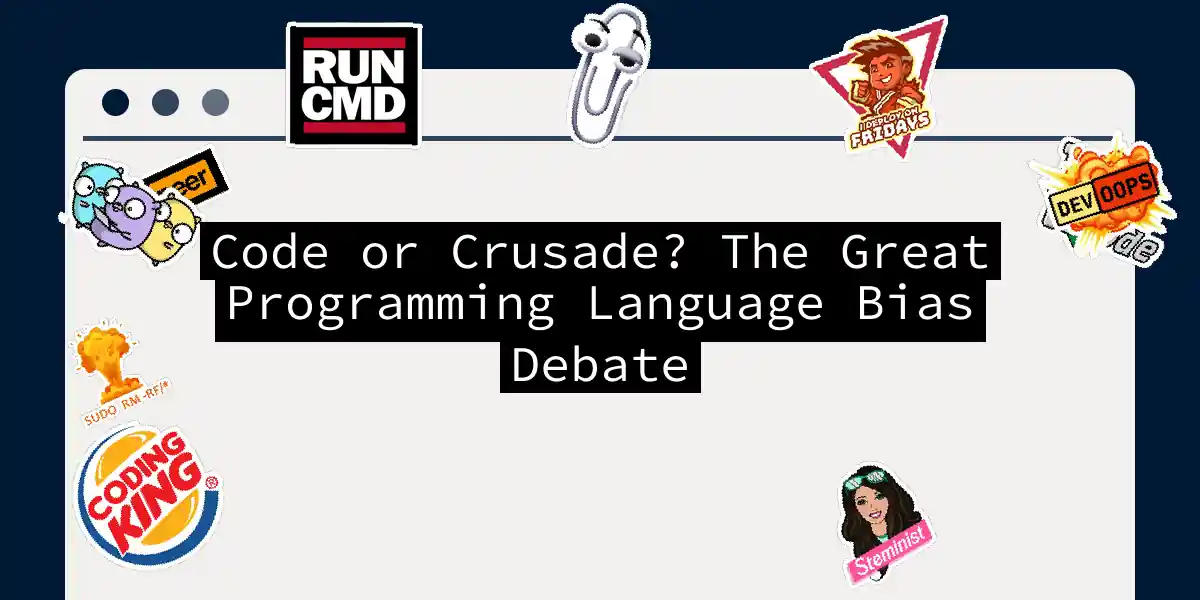Let me start with a confession: last Tuesday, I spent 45 minutes arguing with my coffee machine about whether “dark roast” constitutes political commentary. This is what happens when you spend too much time thinking about algorithmic bias. Today, we’re tackling the elephant in the IDE: should programming languages bake political bias filters into their syntax?
When “Hello World” Says “Goodbye Neutrality”
Modern code isn’t just parsing strings - it’s parsing human culture. Consider this Python snippet:
def sentiment_analysis(text):
positive_words = {"freedom", "equality", "progress"}
negative_words = {"oppression", "corruption", "tyranny"}
return sum(1 for word in text.split() if word in positive_words) - sum(1 for word in text.split() if word in negative_words)
Seems innocent? A 2023 Brookings study found that terms like “freedom” carry different political valences across contexts. Our code might be unwittingly taking sides like a rookie referee at a football derby.
The Case Against Digital Thought Police
“Wait,” I hear you cry, “can’t we just add a #pragma apolitical directive?” Let’s try:
fn main() {
let mut society = Problem::new();
society.add_filter(BiasFilter::new()
.block_partisan()
.neutralize_ideology());
// Compiler error: trait `Noncontroversial` not implemented
society.solve();
}
The Munich/Hamburg study showing LLMs’ left-libertarian leanings reveals a deeper truth: bias isn’t a bug, it’s a feature of human communication. Trying to filter politics from code is like removing salt from seawater - what’s left might be purer, but it’s also useless for cooking.
The Silicon Shield Argument
Proponents point to content recommendation algorithms that created ideological bubbles. Let’s build a simple bias detector:
from transformers import pipeline
class BiasDetector:
def __init__(self):
self.classifier = pipeline("text-classification", model="political-bias-bert")
def flag_bias(self, code_comments):
return [cmt for cmt in code_comments if self.classifier(cmt)["label"] == "PARTISAN"]
# Usage:
detector = BiasDetector()
controversial_comments = detector.flag_bias([
"This implementation follows Marxist dialectics",
"Optimized for capitalist efficiency"
])
The Technical University of Munich approach suggests such filters could prevent AI from reinforcing existing biases. But who guards the guards? The AAAI paper shows even simple models achieve 54% source identification accuracy, meaning our filters might just learn to detect style over substance.
A Middle Path: Transparent Tribunals
Maybe the answer isn’t in the language itself, but in development practices:
function debateFeature(proposal) {
const ethicsReview = new PeerReviewPanel({
diversityRequirements: [
"political",
"cultural",
"disciplinary"
]
});
return ethicsReview.evaluate(proposal)
.then(result => result.approveWithConditions());
}
The arXiv study on context filtering suggests decomposing code into neutral and ideological components. Imagine:
@ideology_filter(strength=0.7)
def generate_content(prompt):
# ... LLM magic happens here
Where developers could adjust filter strength like regex flags - re.IGNORECASE becomes llm.IGNORE_NEOLIBERAL?
My Take (The Spicy Edition)
After trying to make ChatGPT write Trump poetry (it now does, but only in haiku form), I’ve concluded:
- Bias is inevitable - Even
rm -rf /has political implications (anti-data-hoarding agenda?) - Education > Enforcement - A linter warning “This regex might offend anarcho-syndicalists” teaches better than silent filtering
- Embrace the chaos - Let’s add
std::controversy<T>template specializations! The solution isn’t technical purity but cultural maturity. Next time your linter complains about questionable code, maybe it’s not the compiler being woke - it’s holding up a mirror to our own assumptions. Let the flame wars begin in the comments! (But please, no tabs vs spaces debates - we have standards).
